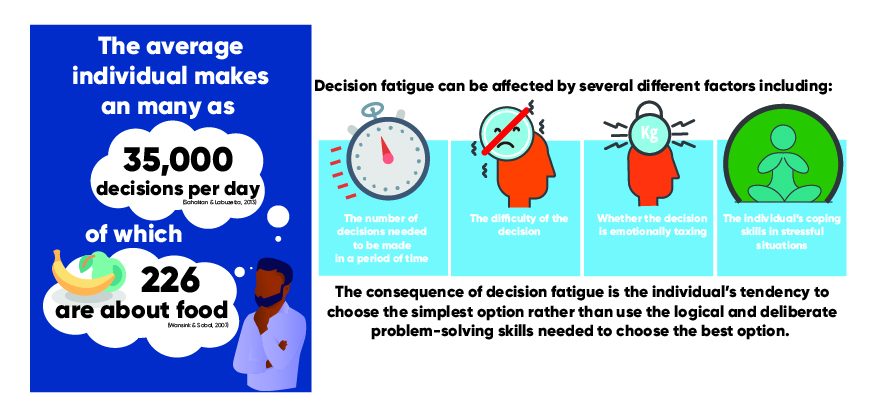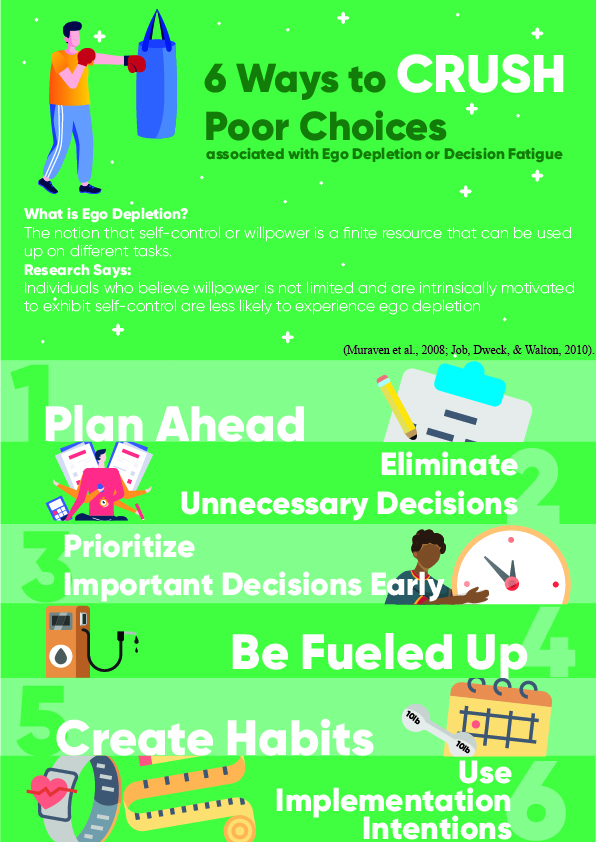Decision Fatigued?

Decisions. Decisions. All day long! Depleted and drained. On the way home grab some fast food and settle in front of the TV. Seems familiar?
In this message, I want to share the silence, power, and hope that sits beyond Decision Fatigue.
On my journey to my Weight Loss Specialist Certification by NASM (National Academy of Sports Nutrition), I came upon this material that I'd like to share with you.
It has been estimated that the average individual makes as many as 35,000 decisions per day (Sahakian & Labuzetta, 2013), of which about 226 are on food (Wansink & Sobal, 2007). The increasing number of decisions an individual is required to make over the course of the day is mentally exhausting and depletes one’s cognitive abilities to exert self-control, especially in the face of temptations. The mental drain due to the demands of making multiple, complex decisions is referred to as decision fatigue (Baumeister & Tierney, 2011).
Decision fatigue can be affected by several different factors including:
- How many decisions need to be made in a period of time
- The difficulty of the decision
- Whether the decision is emotionally taxing
- The individual’s coping skills in stressful situations
- The consequence of decision fatigue is the individual’s tendency to choose the simplest option rather than use the logical and deliberate problem-solving skills needed to choose the best option (Shiv & Fedorikhin, 1999) (Figure: Decision Fatigue).
For example, after a long day at work, an individual may choose to stop at a fast food restaurant for dinner rather than go home to prepare a meal. Decision fatigue is worsened by the overabundance of food-related choices and availability of highly palatable foods that are heavily advertised by social marketing practices. This is best exemplified by the strategic positioning of candy bars and other high sugar snacks at the checkout aisle of stores. Even if an individual was able to resist the temptation of buying unhealthy foods while shopping, by the end of their trip they may be hungry and tired while waiting in line and more likely to purchase the candy bar.
There is more. Ego depletion
is a similar concept to decision fatigue, which regards self-control or willpower as a finite resource that can be used up on different tasks (Baumeister et al., 1998). For example, if an individual has to exhibit strong self-control not to get angry at their roommate for leaving a mess, then they will have a lowered ability to resist eating sweets to cope with those negative feelings.
Research has shown that low glucose levels are associated with poor self-control and impulsive decision-making (Gailliot & Baumeister, 2007). However, once glucose levels are increased the ability to exert self-control is restored (Gailliot et al., 2007). Interestingly, this reversal of self-control only occurred after drinking a sugar-sweetened beverage and not a sugar-free one.
Research also suggests that individuals who believe willpower is not limited and are intrinsically motivated to exhibit self-control are less likely to experience ego depletion (Muraven et al., 2008; Job et al., 2010).
But wait! There is HOPE!
You are not born with an innate ability to have willpower. Willpower is affected by the mind and the body. Being under chronic stress, sleep deprivation, environmental cues (availability of fast food), and having poor nutritional habits (eating a highly processed diet) can weaken one’s ability to demonstrate willpower by impairing the brain’s prefrontal cortex, which controls decision-making and self-control.
Let's talk about a solution.
There are strategies to help lower the likelihood of poor decision making resulting from fatigue or ego depletion.
Strategies to lower decision fatigue and ego depletion:
- Plan ahead
- Eliminate any unnecessary decisions
- Prioritize important decisions early
- Make decisions when not hungry or fatigued
- Create new habitual routine
- Use implementation intentions. For example, “If situation X arises, then I will do Y!”

What next?
Step 1. Today, choose one or several strategies and play for a week.
Step 2. At the end of the week, re-evaluate, adjust, and recommit (or take a new strategy on) for the next week.
Step 3. Meanwhile, listen to Stop Burnout before Burnout Stops You member's training. Join the here and listen to the replay (here is the direct link to replay).
If it feels a lot and you still feel hopeless, please ask for help. Ask me. Ask an accountability buddy. Asking for help is not a sign of weakness; it's a sign of strength and commitment to progress.
I have been called a "taught love coach", "a cheerleader", "not giver-upper", "right time follow upper", and more. Let me and our Club be your biggest cheerleaders.
Schedule your complimentary Discovery Call here and let's talk.
Let's chat for a few min
and discover if I can be of support for you to break through pain, overwhelm, and overweight into strength, balance, and power.

